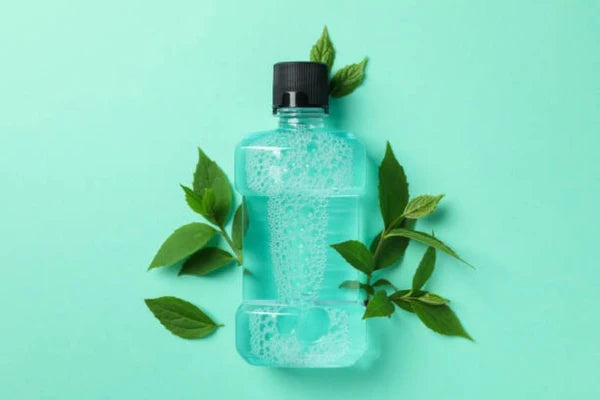Are mouthwashes dangerous for your health?
Did you know that mouthwash does more harm than good if used incorrectly? Because while mouthwash can be a good addition to dental hygiene, it is extremely important to use it at the right time. Furthermore, mouthwash does not replace toothbrushes and toothpaste.
What are mouthwashes really for?
Mouthwash was originally developed to combat tooth decay when a pharmacist named Lingner from Dresden put it on the market. However, we know that today a mouthwash cannot meet this requirement. On the contrary, it only serves to intensify the cleaning effect and prevent the formation of new plaque. It can also help against plaque on the tongue and gives a fresh breath which works well against bad breath.It therefore has a tooth protection feature.
Medical mouthwashes are used as a therapeutic agent for situations of inflammation of the mouth and throat before. In difficult oral hygiene conditions, such as fracture splints or intensive care of the physically or mentally disabled, they replace mechanical cleaning. However, this is of course only a makeshift solution and does not replace actual dental care.
For this reason, a clear distinction must be made between the various mouthwashes. A cosmetic mouthwash consists only of essential oils and cannot combat the growth of bacteria in the oral cavity. It covers unpleasant odours with perfumes and briefly ensures fresh breath. Other mouthwashes, on the other hand, are medical devices that fight bacteria in the oral cavity and cure diseases. These are prescribed by a dentist and should be considered useful.
The different mouthwashes and their use
A distinction is made between caries prevention, gum care and medical mouthwashes.
Mouthwashes for caries prevention
There are two types of mouthwash here, which are sometimes combined into one product: rinses that dislodge plaque so that it can be removed more easily, and solutions with additives that help reduce caries containing fluoride. Fluoride has been shown to loosen plaque more easily and reduce its formation. To prevent cavities, a mouthwash should contain at least 0.025% fluoride. It is useful for people who wear braces or who have had periodontal treatment.
Mouthwashes for gum care
These mouthwashes contain herbs and other ingredients that have a calming effect on the symptoms of inflammation. However, they do not eliminate the inflammation, but rather relieve it. Therefore, such mouthwashes are not a long-term solution. If you have sensitive, bleeding and/or painful gums, you should consult your dentist immediately. In case of allergies, it is recommended to check the list of ingredients.
Medical mouthwashes
These products contain medically effective ingredients, mainly germicidal chlorhexidine. In high doses (0.2 per cent chlorhexidine), these mouthwashes can temporarily replace mechanical toothbrushing. From an oral health perspective, a chlorhexidine mouthwash is the only mouthwash that effectively combats plaque bacteria.
These mouthwashes can be prescribed by a dentist after oral surgery or when mechanical tooth brushing is temporarily not possible.
Some of the ingredients in mouthwash are harmful to your health
The composition of commercially available mouthwashes is almost always the same:
- Ethanol (94.7%) 80.00
- Sodium cyclamate 0.15%.
- Flavouring 3.50%.
- Water, desalted 16.34
- Colouring agent 0.01
Controversial ingredients
First of all, the alcohol in mouthwash can be a problem for alcoholics. Alcohol is effective in disinfecting the oral cavity but is often present in large quantities (up to 30%).
In addition, the antioxidant BHT and the preservative propyl paraben are suspected of acting as an endocrine disruptor.
Anyone who uses mouthwash regularly should also be aware that there may be mild side effects. These include discolouration, burning in the mouth and heavy tartar build-up.
For children, there are alcohol-free mouthwashes containing fluoride. However, it is dangerous to use these when the child is not old enough to spit properly, as they can cause a lot of discolouration.
For medical mouthwashes, be aware that chlorhexidine has side effects after prolonged use (more than six weeks):
● brown staining of teeth and dentures ;
● disturbed sense of taste.
Mouthwash is harmful if used after brushing teeth
It is harmful to use a mouthwash after brushing. This is because the concentration of fluoride in toothpaste is much higher than in mouthwash.
So if you brush your teeth and use a mouthwash immediately afterwards, you are rinsing out the highly concentrated fluorides with low concentration fluoride, which is not enough to protect your teeth from the sugar you eat and drink.
In conclusion
Mouthwashes are not necessary. Those who have good oral hygiene and no problems with their gums do not need an antibacterial mouthwash. So only use mouthwash when you need it to avoid any health risks. On the other hand, you can choose the Y-Brush toothbrush. It is fast and effective in removing dental plaque.It differs from the traditional toothbrush by removing 15% more dental plaque.



